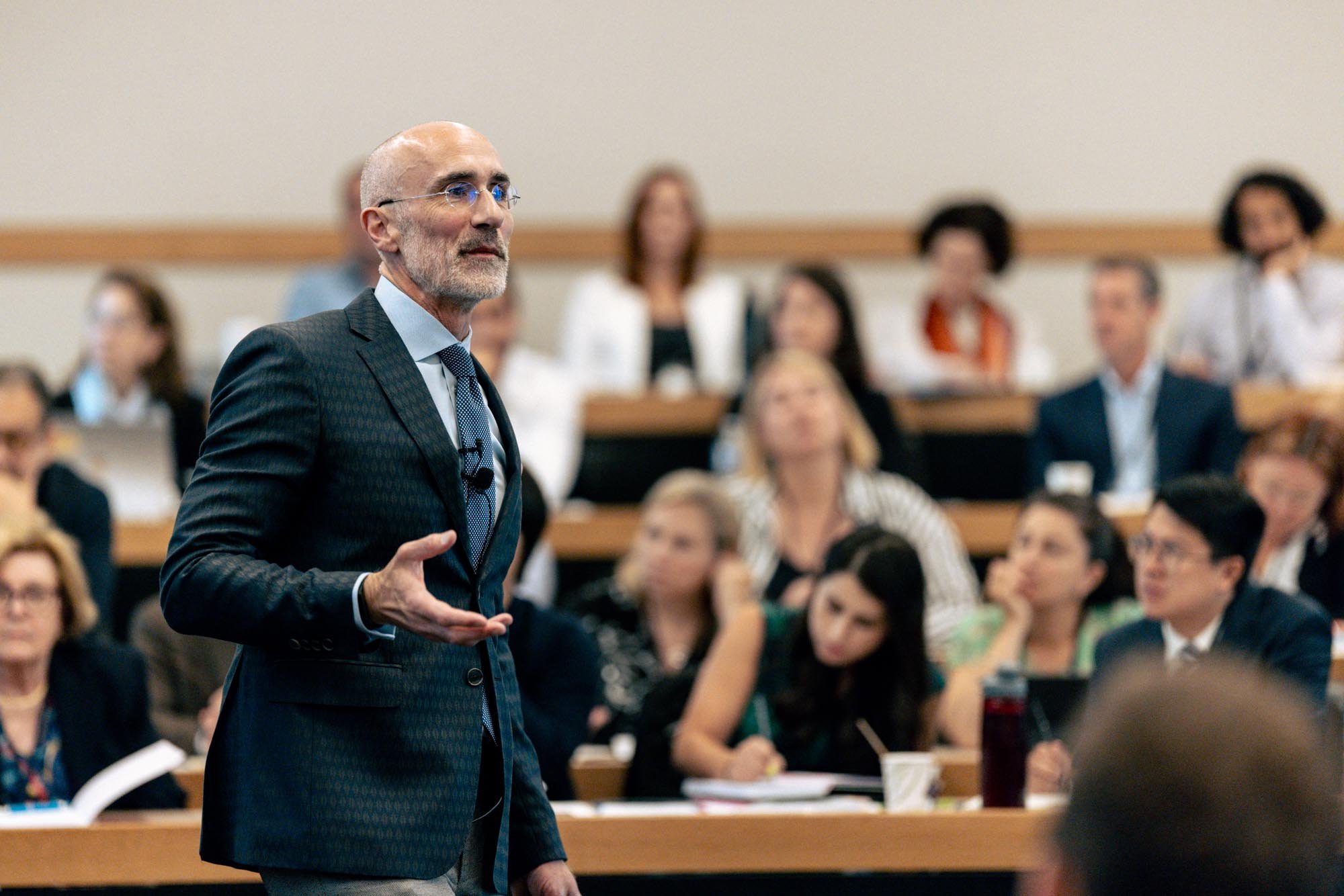Editor’s Note: Seeing the Humanity in Homelessness
THE EMPATHY IMPERATIVE - ADDRESSING AMERICA'S HOMELESSNESS CRISIS SERIES:
EDITOR’S NOTE:
Homelessness is a human and societal failure that demands shared responsibility — not judgment. It reflects how easily we turn away from suffering we no longer see. In his interview and opinion commentary, Dr. Brian Klausner calls for renewed urgency, compassion, and reform to address the complex realities behind this national crisis.
In the Gaps: Better Understanding the Expensive Human Suffering of Chronic Homelessness
THE EMPATHY IMPERATIVE - ADDRESSING AMERICA'S HOMELESSNESS CRISIS SERIES:
Why does chronic homelessness persist despite billions in healthcare spending? Matt Nathan, ALI ’20, interviews Dr. Brian Klausner about his new book, In the Gaps:Better Understanding the Expensive Human Suffering of Chronic Homelessness examining how trauma, inequality, and dehumanization fuel the crisis. Klausner’s insights reveal how empathy, data, and innovative care models can drive real, lasting solutions.
Bridging Political Divides to Tackle the Worsening Social Crisis of Homelessness
THE EMPATHY IMPERATIVE - ADDRESSING AMERICA'S HOMELESSNESS CRISIS SERIES:
OPINION COMMENTARY:
Homelessness is one of America’s most urgent — and expensive — public health crises. In this powerful reflection, Dr. Brian Klausner shares what decades of caring for unhoused patients have taught him about empathy, policy, and humanity — and why solving chronic homelessness requires community collaboration, data-driven care, and compassion.
Changes in US Government Vaccination Policy in a World of Growing Infectious Threats
The recent replacement of the entire CDC Advisory Committee on Immunization Practices (ACIP) raises serious public health concerns, as explored in this interview with infectious disease expert, Dr. Camille Kotton, former ACIP member, by Tom Mahoney (ALI ’24).
In Plain Sight, Out of Mind: Health and Humanity for the Unhoused
Dr. Katherine Koh and Michael Jellison from Boston Health Care for the Homeless Program share urgent insights on rising homelessness and the power of peer-led street teams in this compelling discussion with ALI Fellows Martin Goldstein and Matt Nathan.
Unlocking Potential: A Call to Action for Expanding Mental Health Treatment Options
OPINION COMMENTARY:
Despite a national mental health crisis, access to care remains a significant challenge, particularly in underserved areas. The PSYPACT initiative offers a crucial solution, enabling licensed psychologists to provide telehealth and temporary in-person services across state lines. Virginia Gleason, ALI Fellow ’22, examines the urgent need for the eight states and three U.S. territories still restricting access to vital mental health care.
From Streets to Shelter: How Los Angeles is Tackling Homelessness by Locking Arms and Working Together
In 2023, the Los Angeles Homeless Services Authority, led by Dr. Va Lecia Adams Kellum and Mayor Karen Bass, exceeded their goal of rehousing 17,000 people — bringing over 21,000 indoors. ALI Fellows Belinda Juran ‘20 and Paige Warren ‘21 interview Dr. Adams Kellum to explore how innovative programs like Inside Safe and master leasing, fueled by unified government efforts, are transforming the fight against homelessness in Los Angeles.
Mpox – A Humanitarian Crisis Returns
With mpox re-emerging as a global health threat, particularly in resource-constrained African countries and with severe impacts on children, Dr. Marie Roseline Darnycka Belizaire of the WHO examines the rapid resurgence since the 2022 outbreak, inequities in the response, and strategies for addressing the crisis through collaboration and community-centered interventions.
Training Healthcare Professionals: Addressing Health Disparities from the Battlefield to the City Streets and Countryside
Addressing the challenges of medical care from medical school to the battlefield to city streets to overcome disparities in health, Dr. Jonathan Woodson discusses his journey at the intersection of education, government, and the practice of medicine to train healthcare professionals and leaders to provide effective medical care.
Unlocking the Health and Economic Returns of Closing the Women's Health Gap
Women often do not receive gender-specific health care, leading to disparities in treatment and outcomes. Megan Greenfield and Lucy Perez from McKinsey & Co. explore the reasons behind the global women's health gap and propose actionable steps to bridge this divide by 2040.
The Antimicrobial Resistance Crisis – Reexamining the Incentives
As antimicrobial resistance becomes one of the most worrisome challenges to global public health, Dr. Emilio Emini, former CEO of the Gates Medical Research Institute, examines root causes and hopeful pathways to address the crisis, from foundational biology and private sector incentives to public policy and the need for social impact investment.
Adversity as a Building Block to Achieving Your Authentic Vision
Shirin Behzadi shares with us how she achieved her North Star and overcame adversity by sharing her inspiring story. She also gives us an in-depth look at how to balance your North Star with potential risks.
Kidney Transplantation for Undocumented Immigrants: Time To Find a Solution
OPINION COMMENTARY:
Approximately 3% of deceased undocumented immigrants donate kidneys, yet only 0.2% receive kidney transplants. Dr. Joel Adler highlights this stark disparity and calls for a reexamination of the organ transplant system, advocating for eligibility based on fairness and medical need.
Stem the Tsunami of Suffering From Metabolic Disease – Limit Ultra-Processed Foods in Our Food Supply
OPINION COMMENTARY:
Much of the American diet consists of ultra-processed foods (UPF) that fuel metabolic diseases, ill-health, and unnecessary suffering. We must implement strategies to reduce UPF for our collective well-being.
Brain Care: A Radical Vision for Reducing Risk of Brain Disease
Did you know you can take care of your brain and reduce the risk of developing dementia, stroke, or depression through simple lifestyle changes? Massachusetts General Hospital’s McCance Center for Brain Health lays out a bold vision for reducing the risk of brain disease and scaling it globally.
Pursuing Happiness: Lessons Learned from the Harvard Kennedy School Inaugural Leadership and Happiness Symposium
As you create New Year’s resolutions for 2024, consider applying some of the current research presented at the inaugural Leadership and Happiness Symposium, hosted by the Leadership and Happiness Laboratory Founded by Professor Arthur Brooks at the Harvard Kennedy School’s Center for Public Leadership, to make yourself, your communities, and the world a happier place.
The Moral and Economic Answer to NYC’s Homelessness Isn’t Shelter, It’s Housing
The surge in New York City's homeless population, exacerbated by the expiration of pandemic-related measures, poses a critical challenge, with numbers reaching unprecedented levels. Christine Quinn urges upholding the "right to shelter," faster transitions to permanent housing for cost savings, and collaboration to address the multifaceted crisis.
Rapid Development of New and Affordable Medical Treatments
Did you know that there exist inexpensive generic drugs and supplements that might be effective as novel treatments for many diseases? Yet, pharmaceutical companies lack financial incentives to develop them. Could the creation of a federal agency designed to fund and oversee such efforts lead to new affordable treatments for unmet medical needs?
It Takes A Village: A Multi-Stakeholder Approach to Solving Homelessness in America
OPINION COMMENTARY:
To combat the homeless crisis in America, bureaucratic obstacles that hinder those in need must be overcome. Harvard ALI Fellows Melinda Giovengo and Betsy Schwartz critically examine HUD's Homeless Emergency Assistance and Rapid Transition to Housing (HEARTH) Act and showcase how the Coalition for the Homeless of Houston, Texas has successfully implemented a multi-stakeholder approach.
Brain Energy: New Hope – Treating Mental Health Disorders as Metabolic Disorders
Mental health disorders are costly to society and devasting to the individuals who suffer. By demonstrating that mental disorders are metabolic disorders, Dr. Chris Palmer offers new solutions and hope to address the mental health epidemic.




















